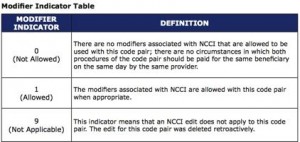I have completed my analysis of NCCI version 16.3, including an analysis of the changes from the last quarter release (version 16.2) to the current release. Here are my summary findings:
- Currently, for version 16.3, there are 688,013 active edit pairs, meaning that, if the procedure codes listed in column 1 and column 2 were to be billed together by the same physician on the same patient on the same day, it is likely that payment would either be denied or the payment amount would be reduced.
- In addition, there are 221,954 terminated edit pairs, which are pairs of codes that at one time were active but under the current version, no longer indicate a restriction of their use as a code pair. For version 6.3, 19,667 new edit pairs have been added to the database while 35 have been terminated, for a net gain of 19,932 new edit pairs. For this version, all have an effective and/or termination date of October 1, 2010 or September 30, 2010.
- There were changes to the modifier indicator for 83 edit pairs with 8 going from an indicator of 0 (no modifier allowed) to 1 (modifier allowed) and the remaining 75 going from a modifier indicator of 1 to a modifier indicator of 0.
- There are now 1,396 duplicate pairs present in the database, a gain of 20 from version 16.2. Duplicate pairs are edit pairs that were, at one time active, then were terminated and then made active again.
- There are also 5,360 swapped edit pairs, which are those that were introduced in one particular order (i.e., column 1 code was 99333 and column 2 code was 92014), terminated and then reintroduced in the opposite order (i.e., column 1 code is now 92014 and column 2 code is now 99333).
NOTE: In the MLN Matters announcing the October edits was also this newsflash:
Get your NEW How to Use the National Correct Coding Initiative (NCCI) Tools booklet from the MLN and learn how to navigate the CMS NCCI website. This new MLN product explains how to look up Medicare code pair edits and Medically Unlikely Edits (MUEs). NCCI tools can help providers avoid coding and billing errors and subsequent payment denials. If you want to become familiar with the “National Correct Coding Initiative Policy Manual for Medicare Services” and the tools on the NCCI website, this is your best resource! Click here to download a pdf of the booklet.


